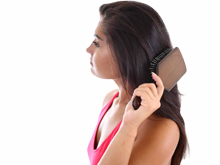 |
"We were hoping he would be spending time looking in the mirror so he might not score as many runs. The hairstyle has changed, but the batting hasn't." |
-Indian cricketer Rahul Dravid had high hopes on his South African opponent Jacques Kallis’ new mop of hair.
“Take a bit of beer and manure, and rub it on your forehead.†- Kallis benevolently shares the secret hair formula.
Hair, and especially the lack of it, could be pretty touchy topics indeed. Hair loss can start with a few extra hairs in the sink or in your comb, and later, it can progress to a bare scalp. Anyone — men, women and children — can experience hair loss. It can be a very devastating and frustrating condition that can take time, patience, and understanding to deal with and get through. However, it can also be a sign of a serious medical condition that needs immediate attention.
Rise and Fall
About 90 percent of hair on the scalp grows continually. The other 10 percent of scalp hair is in a resting phase that lasts two to three months. At the end of the resting stage, this hair is shed. New hair replaces from the same follicle and the growing cycle starts again. Scalp hair grows about one-half inch a month. Most people normally shed 50 to 100 hairs a day. But with about 100,000 hairs in the scalp, this amount of hair loss shouldn't cause noticeable thinning of the scalp hair. Gradual thinning is a normal part of ageing.
8 Reasons for Hair Loss
Excessive hair loss is defined by notable amounts of hair loss usually discovered on your comb, brush, or pillow. On an average, loss of more than 100 hairs a day is considered significant. There are several causes:
- Stress: This is a very common cause of temporary hair loss. It is usually seen after a very devastating event, such as divorce, surgery or job loss.
- Heredity: Your father and grandfather didn’t have a great pate either, and not just when they started getting pension. Yes, you could have inherited hair fall as ancestral property.
- Improper diet: Lack of variety of vitamins, minerals, proteins or even water can often cause significant hair shedding.
- Drugs: Some medications such as chemotherapy can contribute to hair loss.
- Illnesses: High fever, anaemia, sudden or excessive weight loss, and scalp conditions, such as lichen planus (an eruption of shiny flat-topped, itchy, purplish papules), lupus erythematosus (chronic inflammatory collagen disease affecting the skin), ring worm, etc. could lead to hair loss.
- Hormonal changes: This could be due to pregnancy, childbirth, the onset of menopause, or thyroid gland abnormality.
- Trichotillomania: Hair-pulling disorder is a type of mental illness in which people have an irresistible urge to pull out their hair.
- Improper hair care: Some hair products or treatments can actually damage hair and the hair follicle, but with the amount of hair care products around, you would possibly have experienced it firsthand already, right?
However, hair loss is not caused by dandruff and excessive hat/ helmet-wearing.
Is Hair Fall Treatable?
Hair fall may be temporary or permanent. Several non-surgical and surgical treatment options are available.
- Non-surgical methods include drugs like Finasteride, Minoxidil, saw-palmeto extract and vitamin and mineral supplements.
- Surgical methods include hair transplantation, tissue expansion, flap surgery and scalp reduction.
- Recently, targeted phototherapy and stem cell therapy have started showing promising results.
Choosing the Right Shampoo and Conditioner
Look for shampoos and conditioners that contain the following ingredients (yes, now you can also read labels authoritatively):
- Dimethicone:Provides softness and manageability by coating the hair.
- Guar hydroxypropyltrimonium chloride: Achieves maximum volume and smoothness.
- Ammonium lauryl sulphate: This is necessary for a shampoo to clean the hair. Having clean hair, of course, is one of the best ways to keep your hair healthy.
Eat Right
Hair needs vitamins and minerals like iron, zinc, copper and as well as Vitamin C, E, B and biotin (B vitamin that aids in body growth). Healthy foods such as green leafy vegetables, dry fruits, pulses, sprouts, adequate water intake and healthy lean meats are essential. Avoid raw or incompletely cooked egg.
4 Golden Rules
- Avoid heat: Hot products such as straighteners, blow dryers and curling irons can only lead do long term damage. Whenever possible, allow your hair to air-dry naturally.
- Don’t apply chemicals: Avoid harmful chemicals, such as dyes and permanents (including straighteners or curls).
- Brush properly: It is best to brush your hair when it is dry, and brush gently. If you must brush your hair when it is wet, use a wide-tooth comb and if you have tangles, use a detangler.
- Avoid tight hair styles: Hair styles look lovely when done tightly, such as braids or tight ponytails. However, these can ultimately put too much pressure on weak hair follicles.
When to See a Doctor?
Talk to your doctor if you notice sudden or patchy hair loss or more than usual hair loss when combing or washing your hair. Get the right recommendations for your specific hair problem, health status, and diet. And for the record, Jacques Kallis’ secret formula has not (yet) been approved by the scientific community. |
 |
Dr. Umashankar N. is Consultant Dermatologist and Aesthetic Surgeon at Apollo Hospitals, Bangalore |
|